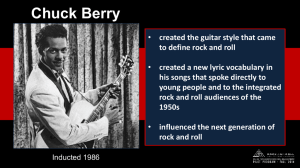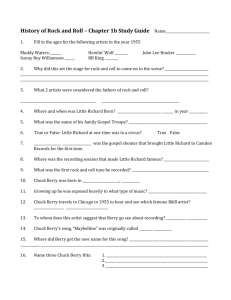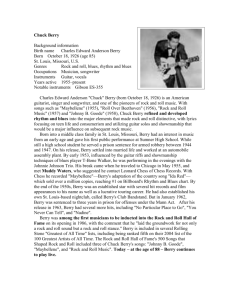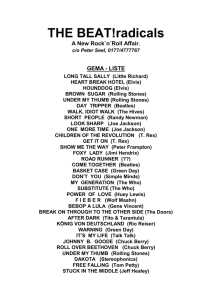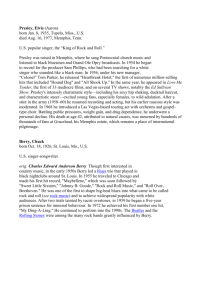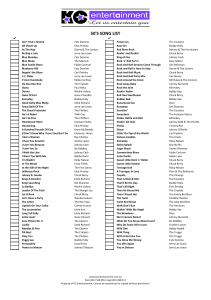Pioneers & DJs
advertisement
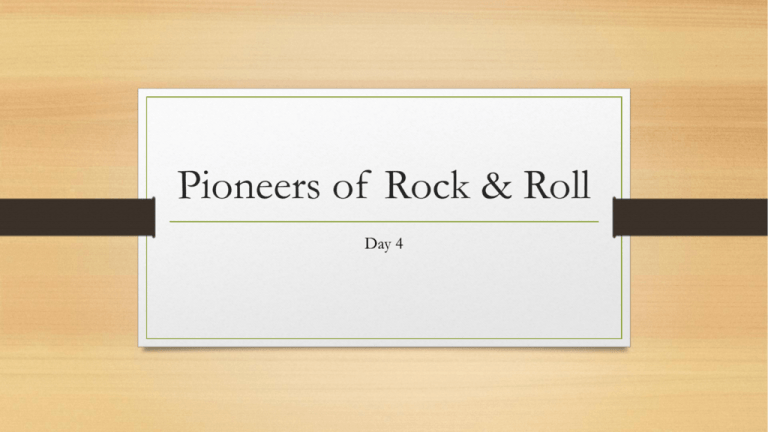
Pioneers of Rock & Roll Day 4 We will… •Evaluate Berry’s role as a Rock and Roll pioneer •Evaluate Berry’s role as a Rock and Roll pioneer •Analyze the energy of the rock & roll piano •Analyze the introduction of the electric guitar Guiding questions • Why is Chuck Berry often considered the most important of the early Rock and Rollers? • How were Bo Diddley’s recordings an anomaly in relation to 1950s Pop music, and how is his rhythm-driven sound and self-presentation a precursor to Hip Hop style? • What factors led to the rise of the electric guitar as the dominant symbol of Rock and Roll? Chuck Berry "There's only one true king of Rock and Roll. His name is Chuck Berry." -- Stevie Wonder "If you tried to give Rock and Roll another name, you might call it 'Chuck Berry.'" -- John Lennon "There's not a lot of other ways to play Rock and Roll other than the way Chuck plays it; he's really laid the law down." -- Eric Clapton "Chuck Berry is the greatest of the rock and rollers." -- Music critic Robert Christgau What do these quotes suggest about Chuck Berry’s role as a Rock and Roll pioneer? Guitar Riffs and Solos Excerpt from Rolling Stone magazine, 2008 In 2008, Rolling Stone selected “Johnny B. Goode” as No. 1 on its list of “The 100 Greatest Guitar Songs of All Time.” Below is a short excerpt from the magazine. “’Johnny B. Goode’ was the first great record about the joys and rewards of playing rock & roll guitar. It also has the single greatest rock & roll intro: a thrilling blast of high twang driven by Berry's spearing notes, followed by a rhythm part that translates a boogie-woogie piano riff for the guitar. ‘He could play the guitar just like a-ringing a bell,’ Berry sings in the first verse — a perfect description of his sound and the reverberations still running through every style of rock guitar, from the Beatles and the Stones on down.” -- Rolling Stone, June 5, 2008 1. Unlike Chuck Berry, several early Rock and Roll pioneers, including Little Richard and Jerry Lee Lewis, emphasized piano in their recordings. 2. What does this article suggest about the impact of Chuck Berry and his emphasis on guitar playing on later generations of Rock and Roll musicians? 3. How does the article describe the introduction to “Johnny B. Goode” and the style of guitar playing throughout the song? The Influence of Chuck Berry’s Guitar Style “Historians tend to place Elvis Presley at the epicenter of rock and roll’s big bang, but we guitarists know better. For us, Chuck Berry had the whole package: great looks, songs, lyrics, voice, and stage presence, plus an innovative guitar style destined to become the most aped on the planet.” -- Jesse Gress, “10 Things You Gotta Do to Play Like Chuck Berry,” guitarplayer.com, Feb. 9, 2012 1. What does Gress suggest about how important guitar playing was to Chuck Berry’s legacy? 2. What does he mean by calling Berry’s guitar style “the most aped on the planet”? Chuck Berry’s Appeal to White Teenage Audiences “Berry's incredible success is due to his ability to articulate the concerns and attitudes of his audience in his music. At the height of his success, Berry was a 30-year-old black man singing to a mostly white, teenage audience. Dubbed the ‘Eternal Teenager,’ Chuck Berry's knowledge of the pop market made it possible for him to break color barriers and play to an integrated audience.” -- From the Official Chuck Berry Website 1. According to this quote, from the artist’s website, which group made up a good portion of Berry’s audience in the late 1950s? 2. What does the quote suggest about why Berry was so popular with this group? • Remember that in the mid- to late-1950s, much of the United States was still segregated by race. 3. Why is it significant that a black artist became so popular with white teenagers in this period? "Johnny B. Goode" 1. Who are the people in the audience? 2. How are the people in the audience dressed? 3. What can you guess about their background from the way they appear? 4. How do they seem to feel about Berry’s performance? 5. What does this clip suggest about how white teenage audiences felt about Berry’s music? Chuck Berry’s Experimentation With Country Music “A piano player named Johnnie Johnson phoned me, asking me to join his Sir John’s Trio for a gig on the eve of the year of 1953… Johnson was the leader and the pianist, Ebby Hardy was the drummer, and I replaced somebody to play guitar and sing… By the Easter holidays we kept a steady packed house on weekends with a well-rounded repertoire programmed to the varied clientele. “The music played most around St. Louis was country-western, which was usually called hillbilly music, and swing. Curiosity provoked me to lay a lot of the country stuff on our predominantly black audience and some of the clubgoers stared whispering, ‘Who is that black hillbilly at the Cosmo?’ After they laughed at me a few times, they began requesting he hillbilly stuff and enjoyed trying to dance to it… It could have been because of my country-western songs that the white spectators showed up in greater numbers…sometimes nearly forty percent of the clients were Caucasian.” -- From Chuck Berry: The Autobiography, by Chuck Berry 1. According to this passage, why did Berry begin incorporating Country influences into his music? 2. How did black audience members react? 3. How did it affect who came to Berry’s shows? Berry’s Performance Style “The other thing is, Chuck Berry was a showman: playing the guitar behind his head and between his legs, doing the duck walk. It's not like you could close your eyes and hear his playing suffer because of it. He was able to do all that stuff and make it look like it was so easy and natural.” -- Source: Rolling Stone, “100 Greatest Artists of All Time,” March 6, 2013 1. What does being a “showman” bring to Rock and Roll? 2. Is it all about the music, or is the kind of showmanship Perry describes an important element as well? Homework Music critic Robert Christgau has called Chuck Berry “the greatest of the rock and rollers.” Is this description justified? What specific contributions from the lesson support this statement? Bo Diddley, a Rock and Roll pioneer Bo Diddley stood out from his contemporaries by crafting a percussive guitar technique that differed greatly from the traditional Blues style that influenced many other guitarists. Compare the following: “Stop Breakin' Down Blues” (Robert Johnson, 1937) “Bo Diddley” (Bo Didley 1954) Bo Diddley’s lyrics In addition to his rhythm-driven musical style, Bo Diddley also differed from his contemporaries in terms of his lyrics. How do these two sets of lyrics differ? Up in the mornin' and out to school The teacher is teachin' the Golden Rule American history and practical math You study' em hard and hopin' to pass Workin' your fingers right down to the bone And the guy behind you won't leave you alone Ring ring goes the bell The cook in the lunchroom's ready to sell You're lucky if you can find a seat You're fortunate if you have time to eat Back in the classroom open you books Gee but the teacher don't know How mean she looks “School Days” (1957) written by Chuck Berry I walk forty-seven miles of barbed wire I use a cobra snake for a necktie I got a brand new house on the roadside Made from rattlesnake hide I got a brand new chimney made on top Made out of a human skull Now come on take a walk with me, Arlene And tell me, who do you love? Who do you love? Who do you love? Who do you love? Who do you love? Tombstone hand and a graveyard mind, Just 22 and I don't mind dying Who do you love? “Who Do You Love” (1956) written by Bo Diddley According to the music historian Ned Sublette, how does Bo Diddley, a “first-generation” Rock and Roll artist, relate to the genre of Hip Hop? In 2002, Spin, a leading music magazine, published a list of the top 50 bands of all time. These are the top five bands from this list. What instruments do you see? The Energy of the Rock and Roll Piano “In a Shanty in Old Shanty Town” (1940s) Artist: Johnny Long Orchestra “Whole Lotta Shakin‘ (1957) Artist: Jerry Lee Lewis 1. 2. 3. 4. 5. Which instruments can you see/hear? Where is the piano placed on the stage? Are the musicians dressed formally or informally? Is the performance more reserved or uninhibited? What other words would you use to describe this performance? The Electric Guitar Brings a New Energy to the Stage Little Richard “Tutti Frutti” in (1957) Chuck Berry “Johnny B. Goode” (1965) Take notes comparing how Little Richard and Chuck Berry are playing their respective instruments. Students should focus on the way each musician is moving onstage. How would you describe the way Little Richard moves while playing the piano? How would you describe how Chuck Berry moves while playing the guitar? How does the piano compare to the guitar in terms of the mobility it allows the performer? What do you think teenagers in the 1950s found captivating about the way a Rock and Roll guitarist can perform while onstage? Why might a performance like Chuck Berry’s have enticed teenagers to want to buy electric guitars of their own? The Electric Guitar Becomes an Affordable Instrument Musician Graham Nash interview discussing the popularity of Skiffle music in 1950s England. 1. How did the devastation caused by bombing during World War II affect the lives of teenagers in cities such as Manchester and Liverpool in the 1950s? Why was Skiffle music attractive to many of these teenagers? 2. What aspects of the guitar, as opposed to the piano, made it practical for young Skiffle musicians in the U.K.? 3. Describe the instruments used in Skiffle music. The Beatles and the Rapid Rise of Guitar Sales Beatles “Long Tall Sally" February 1964 Little Richard “Long Tall Sally” 1956 1. How does Little Richard’s original version of “Long Tall Sally” from 1956 compare to the Beatles rendition in 1964? What instrument have the Beatles left out of their performance? 2. What does the omission of a piano in the Beatles performance suggest about how the role of the piano in a Rock and Roll ensemble has changed by the 1960s? 3. Think back to the way teenagers in the 1950s identified with Elvis Presley. Why might owning a guitar allow a teenager in the 1960s to identify with the Beatles? How do you think this surge in the Beatles’ popularity affected guitar sales in the U.S.? Project Due next Friday• Create a timeline based on the information you have learned through the Rock and Roll Unit. • Write an essay on Rock and Roll’s influence on society and society’s influence on Rock and Roll.
